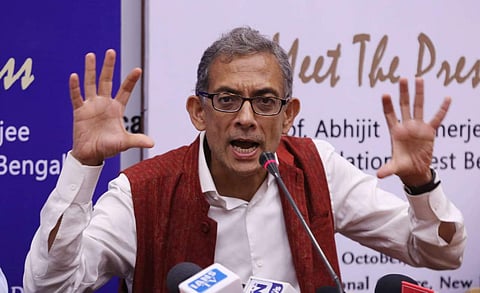

Delay in enforcing a strict lockdown and a stimulus equal to 3 per cent of GDP would have helped lessen the economic impact of the pandemic, feels economist Abhijit Banerjee who was awarded the Nobel Prize in Economic Sciences in 2019 along with Esther Duflo and Michael Kremer.
He was in conversation with Prabhu Chawla, Editorial Director, The New Indian Express, and author and journalist Shankkar Aiyar on TNIE’s Expressions, a series of live webcasts with people who matter. Excerpts:
How do you think the pandemic is being managed by the rest of the world?
The global situation is more mixed than it looks. On paper it looks dire. After being pretty flat for four-five months, it (epidemic) has exploded in western Europe and in the US, returning in a rather scary form. In terms of numbers, it (the second wave) is comparable with the first wave, but in terms of mortality, less serious.
Given the context of rising numbers in the US and Europe, the curve (of new infections) in India has dipped in the last few months. How does India look in the context of the second wave?
Many of the epidemiologists I have spoken to are all a little baffled (by the phenomenon). Especially because there were a bunch of large negative shocks — Onam and Ganesh Chaturthi. Given that, it is rather remarkable the (overall) numbers have gone down. One possibility was that it (increase in infections) was geographically quite localised. It also might be that we are close to the relevant level of herd immunity.
Was the economic cost of the lockdown justified?
The economic cost of the lockdown imposed in India was clearly not justified. We could have waited on the lockdown, by at least a month. If we could have stopped it (increase in infections), there would have been a good argument (for a strict lockdown). We could have organised the economy better (by delaying the lockdown). We could have told people a lockdown is coming – stock up, go home, get a ration card. In retrospect we know that if we waited a month, nothing terrible would have happened.
In the next few months, we will probably have a stimulus somewhere towards the budget. What would be your suggestion be?
The idea of having a portable ration card is critical. Probably the portable ration card doesn’t need to be matched by portable food, but by portable money. If I had to pick one priority, I would say in one year let’s make the Aadhaar-based, bank-linked money transfer system work. This is a new pandemic, we can send people money. It would really make life easier. There are many people who have no (other) recourse (to income support.)
Talking about direct transfers, do you think that Indian economy’s fundamentals are strong enough to have that kind of money to be transferred?
Yes, we could have afforded it. The US printed $3 trillion of (extra) money; the German central bank allowed Europe to print nearly a billion dollars (for direct transfers to people). If India had printed 3 per cent of its GDP and given it away, the economy would have been in better shape. It would have made a huge difference. Now, it’s less true. The economy is cruising back towards more full employment. So, you print money now, you get more inflation.
At this stage, we do not need to print extra money?
I think we still do. There is still a demand deficit. I think it’s still worth giving people extra money, maybe 1% of GDP.